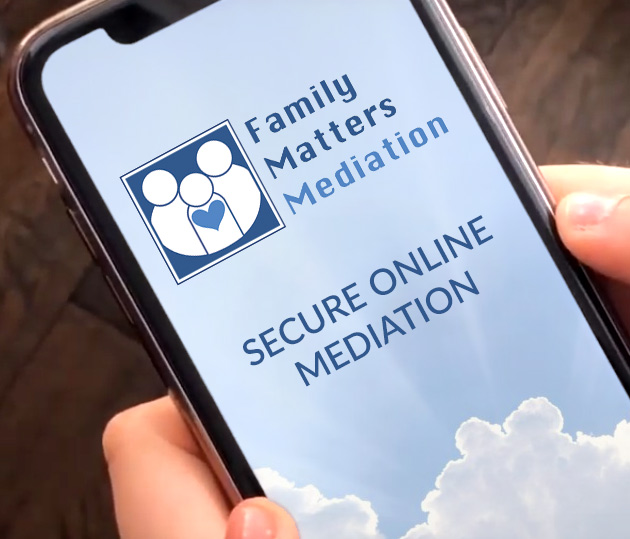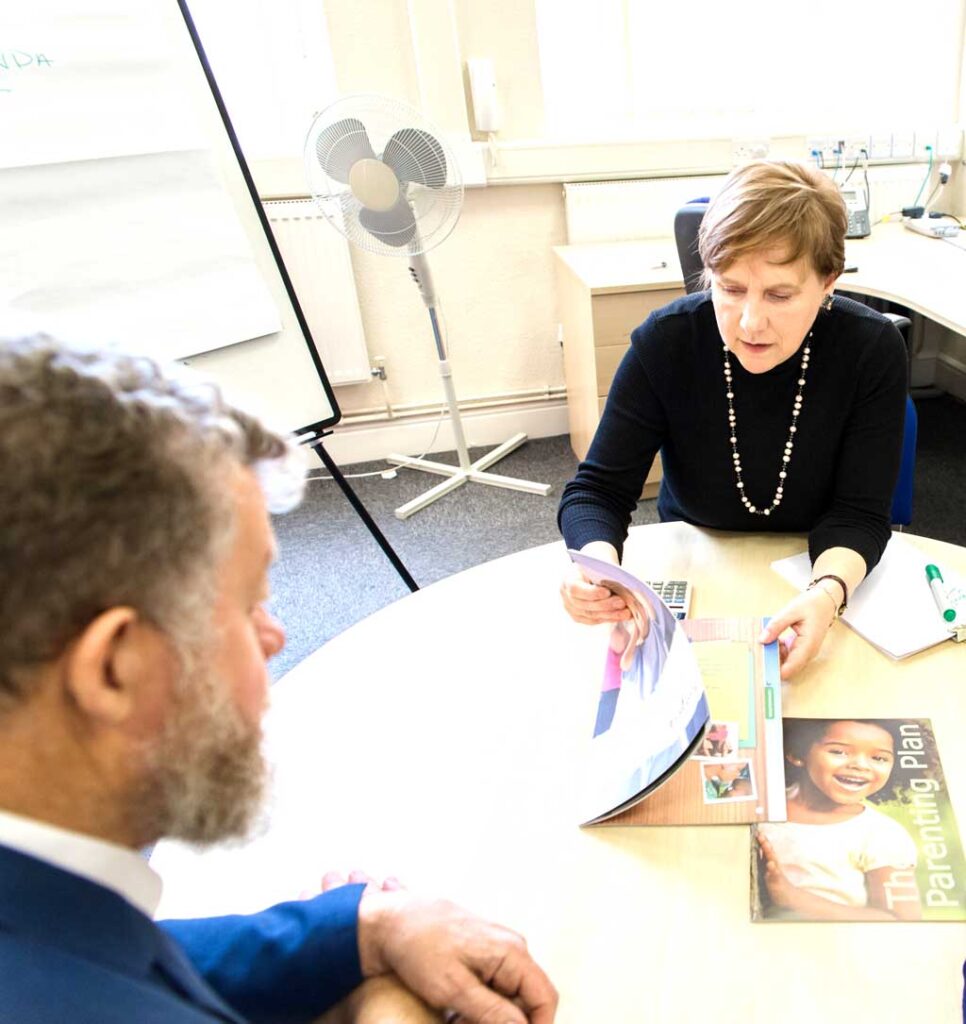- Mediation doesn’t work as well as going to court
- I won’t get a fair deal using mediation
- I’ll have to face my ex in the same room
- Mediation doesn’t work for later life divorce

Director, Family Matters
These are just some of the comments we have heard about using mediation to sort out your family issues. They are all FAKE NEWS!
There is a lot of support for family mediation – including from the government, which recently launched a scheme that offers up to £500 in funding for mediation involving children. We know how effective family mediation is and here, we try to debunk some of the FAKE NEWS we have heard.
We must go into the mediator’s office to take part in mediation
Some people prefer face-to-face MIAMS and mediation meetings. However, one good thing to come out of the COVID-19 pandemic, is that it has given us chance to find out how successful online mediation really is.
Family Matters offers online mediation using easy, well-known and safe technology such as Skype, Facetime and Microsoft Teams. We are now mediating online with 98% of our clients.

Online mediation is convenient, as it means we can offer mediation wherever you are in the country at a time that is convenient to you. You don’t have to come into the office, arrange childcare, find transport or parking. We have successfully carried out online mediation with people all around the country, such as Nora and Sean.
Our online mediation is secure as we have Cyber Essentials accreditation, which means the information you give us will be safe.
Read our director’s view on online mediation here.
Mediation can be used to delay matters
Mediation offers almost the opposite of delay. It avoids the need to go to court – which can be a very long-winded process, especially at present, as courts are still trying to catch up with delays caused by COVID-19. Mediation will normally take between two and four meetings, all of which can be carried out in a time frame to suit you. You are always in control of the process. Mediation is faster, easier and cheaper than traditional ways of dealing with divorce and separation issues, like going through the court process.
My children’s views will not be listened to in mediation

We believe that your children’s views relating to your separation are important and we can meet with them if both parents agree. Our trained child consultants will work to understand your children’s views and concerns and will feed these back to you in one of your mediation sessions. This will really help your children to know that you are listening to them and that their feelings are important.
Mediation won’t work if we are older
We understand that you might have different things to talk and think about if you decide to divorce later in life. Your children may have flown the nest and your mortgage might be paid off, but issues such as pensions, elderly parents, grandchildren, retirement plans and even an inheritance are all issues that need to be discussed. Mediation gives you the opportunity and the time to work out your plans and come to an agreement that is individual to you. You don’t have to adhere to a plan that might be fixed by a court.
The mediator will tell us what to do
Mediators do not impose decisions on people. They are impartial and neutral and help people make their own decisions about issues that affect their future, such as their family and finances. Mediation is focussed on you, the client, and is driven by you. You are in control. You decide the pace and direction of the discussions. Unlike the court process, in which a judge makes the decisions, within mediation, you can discuss and agree solutions that will work for everyone and that are workable and practical.
My partner and I will have to be in the same room

You don’t have to see your ex-partner if you don’t want to, or you don’t feel that you can. Shuttle mediation is where you are each in separate rooms and the mediator will move between the two rooms. This takes a bit longer but works just as well. Shuttle mediation works when mediation is online, where you can sit in separate online rooms and our mediators will move between you. This worked well for George and Mabel from Walthamstow, who were able to come to an agreement about their children.
We will discuss this with you in your MIAM. For in-person mediation, we can also arrange separate arrival and departure times .
The mediator will try to get us to get back together
Mediation is not counselling. They are different. Mediators will not offer counselling or try to get you back together. We focus on finding solutions for the things you want to agree upon after your separation. If our mediators think that you are thinking about getting back together, we will signpost you to an appropriate marriage guidance counsellor or other professional.
Whatever we agree in mediation, it isn’t legally binding
Mediators cannot offer legal advice during mediation. Family mediators have a duty to be neutral and this means we cannot take anyone’s side. This enables us to help you to focus on issues that relate directly to your situation.
At Family Matters, we will always encourage you to take legal advice on the decisions you have made. Once your mediation is completed, your mediator will prepare a document that can be made into a legally binding document by a solicitor.
Mediation will only work if my ex and I already agree
This is not true. Mediation is there to help you find a way forward – whether you are already halfway there or miles apart. You know your family and what will be best for you all. Mediation allows you to discuss and agree solutions that will work for your individual circumstances rather than have agreements imposed on you by a judge in court.
Read about Katie and Oliver, who came to Family Matters after 18 months of talking to solicitors about their finances without an agreement.
Mediation is only for those on a low income
Again, this is not true. Mediation is certainly a more cost-effective process than going through the court system, but cost is not the only issue. Mediation works for everyone, irrespective of wealth. The true value of mediation is that it allows couples to identify and agree their own solutions with the help and support of the mediation process. Mediation is often used by wealthy and high-profile couples – even where the press doesn’t report it as such – because it is confidential and they remain in control of the outcome.
Mediation is equally helpful in cases where there are high-value assets as the same principles of open disclosure, development and consideration of the options apply.
Mediation is too emotional and difficult. It will be easier to let my solicitor and the court deal with it
Going through the court process is always costly in terms of time and finances, but it is also extremely emotionally stressful. Discussing and making decisions about children and your financial future is difficult and can lead to heated conversations during court proceedings, resulting in an agreement that just does not work for anyone.
Mediation is all about you and your future. It helps to reduce conflict and emotions don’t run so high, so it’s easier to have the conversations that are needed, making it more likely that you can see and agree sensible solutions more quickly.
Many people self-report that they feel empowered in mediation and that it helps reduce stress. The NHS agrees.
Mediation won’t work for us as we are in a same-sex relationship
Mediation works well for same-sex couples, whether married, in a civil partnership or living together. The court system has evolved to deal with marriage break-ups, and we understand that same-sex couples don’t always have the same issues as married heterosexual couples.
We have helped several same-sex couples to come to agreements on issues relating to children – where the parenting structures might have been different to conventional relationships and there may have been issues relating to parental responsibility due to the different means of conception – adoption rules, surrogacy issues and the rights of biological and non-biological parents, for example.

Mediation also offers an excellent way of sorting out financial issues for same-sex couples. For example, the consideration of financial contribution made during the marriage or civil partnership can be an important issue to consider when it comes to ensuring a fair split of assets. As same-sex marriage and civil partnership have only been legal for a relatively short time, many same-sex couples lived together for many years before their relationship was formalised into such a union, and that might not be taken into account by a court. In mediation, you are in control of how your assets are split and will be able to take account of the full length of your relationship.
There is no financial assistance for mediation
Mediation will work for most couples, irrespective of their income. However, if you are on a low income and need financial assistance, you might be entitled to legal aid, which is still available for mediation. At present, if you are mediating about your children, you may be entitled to a government voucher of up to £500. Family Matters is one of the firms to have used the scheme the most, so we really understand it. Find out more hereor contact us for more information.
Our divorce will be complex – mediation won’t work
Most divorces have complex issues, such as children, finances, a business or pension. Whatever issue you have, if a judge can make a decision on it, we can discuss it in mediation, and you can come to an agreement – at a fraction of the cost of going to court.
So, if you are separating, divorcing or dissolving a civil partnership, whatever issues you have, mediation could work for you. Contact us now to talk to one of our experts to find out how.



